Some of the issues around practising law in South Auckland are ‘pretty challenging’ but lawyers are also being kept busy with the amount of development and expansion going on.
Manukau and the wider South Auckland area provides plentiful work for criminal barristers. The District Court is the busiest in the country, but the continual expansion due to Auckland’s extraordinary growth means plenty of work for lawyers in other fields.
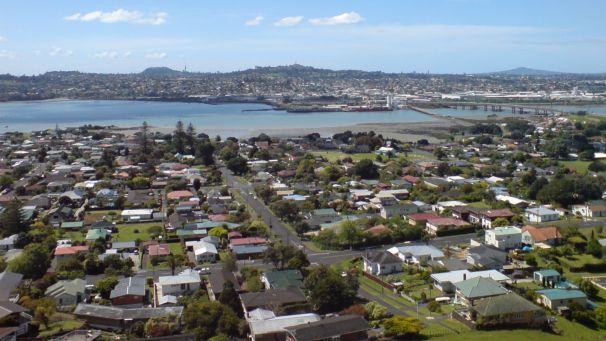
A view northwards over South Auckland, with Onehunga in the centre distance.
One Manukau-based firm, Denham Bramwell, does the whole gamut of suburban legal work: family, property, conveyancing and commercial work as well as civil litigation and employment matters.
Amy McCormick, a solicitor on the firm’s family team, says, like many suburban and provincial areas, there’s a diverse range of work to attend to.
“Having a broad firm means that our clients can come along to resolve a few of their matters at the same time. And it’s a diverse, large area. It’s farming areas going all the way through to the city so there’s a range of clients with a broad range of matters.
“It does seem like a whole different place to Auckland; there’s something about the South Auckland legal community that’s nice. We have a really collegial bar: it’s a nice, collegial place to work.
“The issues that some of our clients face are pretty challenging, there’s a huge diversity, huge socio-economic issues so it’s good to be in a place where everyone gets that and works together.”
Legal aid work
Denham Bramwell continues to do legal aid. Amy’s colleague Anna Fuiava, an associate in civil litigation, says their legal aid work is not restricted to crime and family law.
“Our civil team does do legal aid and I think there are even fewer civil legal aid providers than there are family law legal providers, so that is quite a big part of what Denham Bramwell does in Manukau.”
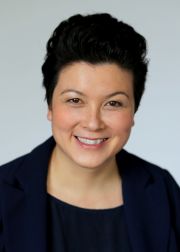
Anna Fuiava
Ms Fuiava, who was born and raised in Auckland, has worked in Manukau for both Denham Bramwell and another barrister for “pretty much most of my legal career”. She says there’s good reasons for plumping for local lawyers.
“In terms of what we do in civil litigation there’s a lot of work out here, there’s a lot of businesses here who don’t necessarily want to travel into the city to see a lawyer,” she says.
“There’s a huge population that, particularly for legal aid matters, would just have no means of seeing a lawyer in the city. There are several community law centres in South Auckland which we liaise with if their clients need to go to court often and then they’ll be referred to us to take the matter further.
“It just feels like it is real and you’re seeing people on a day-to-day basis that you’re trying to make a difference for.”
A great place to learn
Panama Le’au’anae of Friendship Chambers has been a barrister for 20 years and a lawyer for 35 years, most of that in Manukau apart from a spell in Otahuhu.
Mr Le’au’anae says the area provides some interesting and challenging work.
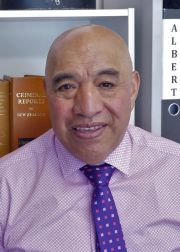
Panama Le’au’anae
“You get a range of work, very challenging work, but it’s very rewarding because you’re dealing with some of the most difficult cases out here. It is a great learning place. You learn very quickly because of the diversity and the nature of the work you are dealing with.
“There’s a lot of legal aid work and the majority of what I do has a legal aid element, I’d probably say 90%, and that’s down to the socio-economic make-up of the area.”
This is not surprising given that the District Court is busier than any other around the country. Ministry of Justice figures show that in the year to 30 June 2019, Manukau District Court had 4,805 active criminal cases, about 700 more than Auckland’s District Court. It is also the busiest Youth Court in the land and the second busiest Family Court, behind Christchurch.
“Those who work out here appreciate just how challenging the work is and the complexities of it,” says Mr Le’au’anae.
Wide social range
Importantly, Mr Le’au’anae notes, the Manukau courts and the practitioners based there cover a wide range of society.
“It has a very large catchment area; you have East Auckland which is a lot more affluent, then you have the much more economically-deprived areas such as Otara and Mangere.”
He says some areas don’t have any lawyers, and Mangere, for example, has a community law centre to deal with much of the legal needs of that suburb.
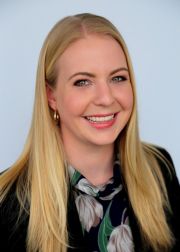
Amy McCormick
“A lot of law firms don’t deal in legal aid – they don’t see it as being financially worthwhile so you don’t get the law firms out here. Instead, there’s a lot of small operators. You’ve also got firms out in Papakura, and around there which are well established and they have old clients, and a lot of those are from the farming communities.”
Amy McCormick says many of Denham Bramwell’s legal aid clients live below the poverty line.
“There are a lot of issues with gangs and drugs, there’s a lot of children in need of care and protection, and there’s a lot of involvement with Oranga Tamariki. You have to be aware that it’s a really daunting process and there’s an awful lot going on for clients when you’re acting for them.”
Anna Fuiava told LawTalk a tale of how one family living in an over-crowded rental property was completely unaware about even the basics of tenancy agreements. She says that family may be a lucky one in finding legal support but many others might not be so fortunate.
Community foothold
Panama Le’au’anae says his Pacific background and being based in the area for many years makes it easier to understand the complexities of some people’s issues.
“I find it extremely enjoyable working in Manukau; I suppose that’s because I am Pasifika, I deal with a lot of Pacific Island people, from Samoa, Tonga, Cook Islands, and Māori, so I feel comfortable working with those communities. I was born and raised here so I understand the New Zealand psyche.
“We have a lot of barristers sole who mainly deal with Family Court and criminal work but there are a lot of Auckland lawyers who come down and pick up serious criminal briefs. But they work and operate in town, which makes it difficult for our clients because they don’t have the financial means just to get into town. A lot of High Court cases in Auckland are South Auckland related.”
And he feels that the busy workload of the court should warrant consideration for expanding the court so that many of the more serious cases can be dealt with in Manukau.
“There has certainly been a desire to get a High Court in Manukau given the large number of serious cases here, but I guess it comes down to cost as with many things. I would have thought there would be enough work to justify having a High Court here.
“The Family Court is bursting at the seams. We don’t have enough judges out here so it’s always one of the challenges we have: far too much work and not enough resources.”
Property boom
Paul Maskell is the managing partner of Inder Lynch, which has been in Papakura since 1946, and has offices in Papakura, Pukekohe and Manukau. He joined the firm in 1979 at its then Manurewa office.

Paul Maskell
Mr Maskell, who works predominantly in family law, including elder law, says property is the biggest money-earner for the firm.
“About 40% of the firm’s work is in property. Chris Lynch, one of the partners at Papakura, is the leader of our property law team and he’s doing a lot of sub-divisional work because there is so much going on in Papakura, Drury, Karaka and out to Pukekohe now. And we’ve got a number of young lawyers dealing with residential conveyancing that flows from that.”
Inder Lynch is one firm that has cut back on legal aid work, due to necessity.
“We just could not see how our firm structure could make the rates that we were being paid back then economically viable but we have four lawyers who are primarily doing family law, and that is mainly paying client family law,” says Mr Maskell.
Regional rather than suburban
A story that has been told to LawTalk many times in our visits to regional and suburban settlements is that the client base is loyal and often generational, leading to a need for more general practice work rather than specialising in certain areas. “We see ourselves more as a regional firm than a suburban firm, as much as you would get in Rotorua, Hamilton, Tauranga.”
Mr Maskell says while Inder Lynch has a strong base in Papakura and ‘south South Auckland’, it is a different situation a little further north. “Manukau is, to an extent, in competition with the Queen Street law firms because if they [clients] live in Onehunga or Howick they can come south to us but equally they could go slightly north into the central city.”
“People from outside of Auckland often think of Auckland as one big entity but the reality is that there are significant differences and South Auckland is different from the city and the community is reasonably tight,” he says.
“These areas have grown considerably recently. For example, Flat Bush will have about 40,000 people from virtually zero a few years ago, and that will continue due to the pressures elsewhere.”
Amy McCormick says lawyers in court tend to help each other and that’s partly down to the type of work that presents itself in Manukau.
“Everyone knows the issues that our clients are facing. When you’re dealing with hard cases and often quite emotionally challenging cases as well, the last thing you want to be doing is having a fight with the lawyer on the other side. But we get all get on and are there to help each other.”
New Zealand Law Society Auckland branch data shows there are about 650 lawyers in an area stretching from Penrose down to Waiuku/Pukekohe.
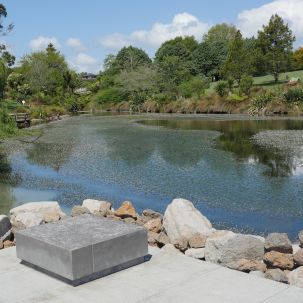
The Manukau centre was planned in the 1960s, and it was designed as a major administrative and commercial centre that would service southern Auckland, at a time when the area was predominantly rural.
Several government functions and service agencies were shifted into purpose-built office buildings well before the wider area developed. The Manukau Mall followed in 1976 and the Rainbow’s End theme park opened in 1982.
The Auckland Plan expects significant growth in Manukau over the next 30 years both in terms of population and jobs.
The Ministry of Health’s website notes that the population projection of the Counties Manukau District Health Board (which covers the diverse areas of Manukau, Franklin and Papakura) for 2018/19 numbers 563,210. Of these, 21.1% are Pacific – compared to a national average of 6.5% – Māori contribute 15.7% – the exact same as the national average – and ‘Other’ (which includes Pākehā and all Asian communities) make up 63.2%, whereas the national average is 77.8%.
The increasing population has resulted in the Representation Commission recommending that a new electorate be created in South Auckland.
The DHB statistics also note that the population is generally younger than the national average – for example 14.5% of the DHB’s population is aged under nine, and 14.1% are aged 10 to 19. This compares to the national average of 12.8% for both age demographics. Meanwhile, at the other end of the age scale, only 5.3% are in their 70s, lower than the national average of 7.0%.
The figures show that: “Counties Manukau has proportionally more people in the most deprived section and fewer in the less deprived sections of the population.”
While Rainbow’s End is the biggest attraction, there is also Ōtara market on Saturday mornings plus a number of other regular markets, the Auckland Botanic Gardens, Manukau Memorial Gardens, Ambury Park, Ayrlies Garden & Wetlands, and the Mangere Arts Centre.
Sources: Auckland Council, New Zealand Law Society, Counties Manukau District Health Board, and TripAdvisor.
